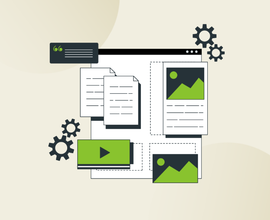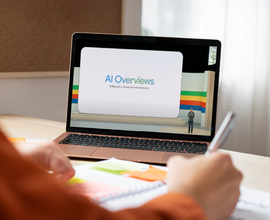Why Organic Marketing Is The Solution To A Cookieless World
- Thought Leadership
- By Allie Bhutani
- 7 minutes read
Why you need SEO and organic marketing now that Google third-party cookies and targeted digital advertising are being phased out.
Why Organic Marketing Is The Solution To A Cookieless World
As you probably heard, Google plans to phase out third-party cookies in Chrome by 2023. The web browser has implemented an update that prevents third-party tracking cookies by default, a move that will dramatically impact how digital ads are currently tracked and served. While the days of cookies and paid ads may be numbered, there is no need to panic. This announcement should encourage you to reevaluate the future of your digital ad spending. The solution? Going organic.
Why The Future of Targeted Digital Advertising Is Uncertain
Cookies are little bits of code that keep track of your browsing habits. This information is then sold to advertisers so they can display targeted ads that are catered to specific interests. Without them, digital advertisers will essentially be blind to who you are. For companies that rely on these ads to generate brand awareness and sales, the phasing out of cookies will have drastic consequences, leaving the future of targeted digital advertising uncertain.
Why Organic Marketing Is The Most Effective Digital Marketing Channel
What is organic marketing? It's a strategy that centers on creating and enhancing a business’ or brand’s visibility and web presence in order to draw in customers and users naturally over time instead of via paid ads. Organic marketing is achieved by creating relevant content that gets you found on search engines and ultimately drives traffic to your website. For example, when you look something up online, the SERP (Search Engine Results Page) will usually display two things. The first are paid search or “suggested ads” that use cookies and other metrics to target ads. The second are results based on relevance and utility. That is where good SEO comes in.
When a page that is SEO optimized ranks in a SERP and is easy for someone to find, it’s because that page has authentic and relevant content the algorithm believes will be useful to the person doing the searching. That's why it’s considered ‘organic.’ Instead of using cookies and paid ads to reach an audience, organic marketing helps users find the best content available in a natural and organic way. This isn't just about promoting an advertisement for a product or platform that touts its own benefits without considering the user's needs or what they are actually searching for. It's about creating thoughtful pieces of helpful content that rank because they answer the questions your audience is asking. By focusing on delivering relevant information, organic marketing has the ability to connect with people in a meaningful way that paid ads can't.
Additionally, because of Google's recent announcement to stop selling ads based on cookies, paid ads will soon lose a great deal of their target power and reach. On the other hand, organic marketing will continue to link people with the content they are searching for. Think about it like this, when you stop investing in paid ads, the momentum comes to a grinding halt. The ads no longer appear and no new leads or customers can be generated. Conversely, organic content continues to drive traffic long after you have created and invested in it. That’s because search engines will keep ranking content that people find useful. It's a tried and true method built on the fundamental idea of strategic quality over the broad net of paid quantity.
As long as the content you create stays relevant, good SEO and organic marketing will ensure you continue reaching new customers and stay competitive within your industry. Here is why:
- Attract the right customers. With a traditional advertising campaign, you're paying to be seen by customers. But, with organic SEO, you are reaching people by providing the content they genuinely want. Instead of trying to get people to click ads, you can spend time creating genuinely good content that is entertaining, informative and educational. That way, trust is built between your brand and your customers. Remember, the visitors on your site aren't just from one demographic, and good SEO allows you to be discovered by people outside a targeted ad's immediate scope. By ranking higher for keywords and appearing in SERPs, you will get more visitors to your site and better-qualified leads. On top of that, when people enjoy your content and find it useful, they'll be inclined to share it, further expanding your user base.
- Long-term ROI. With paid ads, you will be doing just that: paying. As long as you are willing to pour money into the campaign, the ads will continue to run. But, it's expensive and users aren't nearly as qualified. You pay per click, so the possibility for economic efficiency is much lower. You also don't have as much control over your advertising spend, and there's always a possibility your ads won't show up at all. Not only is organic marketing a smaller financial commitment, but the benefits are also much more long-term, and your ROI much higher. Because the content is based on connecting people with quality and relevant information, SEO will continue to work as long as the information remains useful. It's an enduring and foundational approach that helps brands stay consistent when unpredictable disruptions like Google's phasing out of third-party cookies occur.
- Convert better quality leads. When you rely on paid ads, your business or brand can seem a little too sales-driven. People can tell when you're trying to sell them something, and it makes them weary. The value of a paid ad is often based on making a sale, which to a consumer seems to benefit the business. Organic marketing, on the other hand, creates value in being able to give the user what they need. And because consumers are savvier than ever before, they can tell when someone is trying to sell them something versus genuinely help them. In fact, one study shows that 94% of people click on organic content over online ads, and two to four times the number of leads will convert to customers when organic marketing is used.
Why You Need SEO Now More Than Ever
The landscape of digital advertising is quickly changing as paid ads are becoming increasingly volatile and unreliable. With the increase in privacy laws, users will have more control over the data they share, meaning targeted ads will be less specific and more random. If your online advertising budget relies heavily on PPC advertising, your campaigns may be taking a big hit and your ROI will soon diminish. In the world of marketing, an industry driven by data and metrics, diminishing returns are a strong indication that it's time to try something new, and with Google's recent announcement, that time is now.
Where paid advertising fails to stay consistent in the shifting landscape of solution providers and privacy laws, organic marketing supplies a reliable approach that will continue to work for you. Because it’s grounded in helpful and efficient content that does not rely on cookies, organic SEO marketing remains unaffected by the shift in privacy laws. That means that once you have laid the foundation, your organic marketing efforts will keep delivering well into the future. Additionally, by investing in your organic presence, you can spend more time being innovative, creating valuable content and connecting with your audience, and less time worrying about unpredictable advertising campaigns and ad spend. Users get more of what they are looking for, and your brand gains visibility among an engaged demographic. In other words, everybody wins. Although the end of cookies is near, Google's algorithm updates will continue to rank the most relevant content. By prioritizing organic marketing, you can mitigate the negative effects of diminishing ROI on paid advertising and keep your brand ahead of the curve.
So Now What?
It's time to shift your focus from paid ads to an organic SEO strategy. If you are ready to start seeing results with organic SEO, begin exploring your options by taking a demo of Conductor and make the most of your organic marketing efforts.







